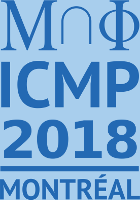Physics and Mathematics of Quantum Field Theory (18w5015)
Organizers
Jan Derezinski (University of Warsaw)
Stefan Hollands (University of Leipzig)
Karl-Henning Rehren (University of Göttingen)
Description
Quantum Field Theory (QFT) is the established theoretical framework to understand the fundamental constituents of matter and forces, with the exception of the gravitational force. It combines the principles of Quantum Mechanics with relativistic covariance and Einstein causality and leads to quantities describing fields (such as the electric field), which are, at the same time, to be viewed as fluctuating quantities subject to a fundamental uncertainty.
The question how to formalize mathematically this theory has found several answers in the 80 years since its birth, illuminating the many facets of this extraordinary theory, but the quest for the ultimate mathematical framework is still underway. Sometimes, ideas and approaches undergo a hibernation period, and are being awakened many years later when unexpected progress occurs. This is again happening in QFT right now and on several fronts, for instance concerning recent new developments relating "stochastic quantization and partial differential equations'' and "constructive methods'', in operator algebraic approaches, or in approaches based on the "operator product expansion'' combined with powerful symmetry principles enhancing the usual symmetry of relativistic theories by scale invariance.
It is an exciting time to take stock of these recent developments and to invite researchers representing various mathematical treatments of QFT. We believe that the workshop will be a great opportunity to exchange ideas between various research communities. Beside mathematical physicists, we would also like to include practitioners of QFT -- theoretical physicists studying high energy physics, especially, extensions of the Standard Model.
The question how to formalize mathematically this theory has found several answers in the 80 years since its birth, illuminating the many facets of this extraordinary theory, but the quest for the ultimate mathematical framework is still underway. Sometimes, ideas and approaches undergo a hibernation period, and are being awakened many years later when unexpected progress occurs. This is again happening in QFT right now and on several fronts, for instance concerning recent new developments relating "stochastic quantization and partial differential equations'' and "constructive methods'', in operator algebraic approaches, or in approaches based on the "operator product expansion'' combined with powerful symmetry principles enhancing the usual symmetry of relativistic theories by scale invariance.
It is an exciting time to take stock of these recent developments and to invite researchers representing various mathematical treatments of QFT. We believe that the workshop will be a great opportunity to exchange ideas between various research communities. Beside mathematical physicists, we would also like to include practitioners of QFT -- theoretical physicists studying high energy physics, especially, extensions of the Standard Model.







